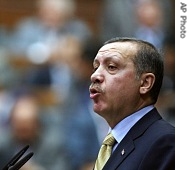-
(单词翻译:双击或拖选)
By Dorian Jones
Istanbul
10 June 2008
Turkish Prime Minister Recep Tayyip Erdogan said on Tuesday the Constitutional Court must explain its decision to overturn the government's move to allow students to wear Muslim headscarves at university. Last week's Constitutional Court ruling was the most serious setback1 for the Islamist-rooted AK Party since it came to power in 2002. Dorian Jones reports for VOA from Istanbul.
 |
| Turkish Prime Minister Tayyip Erdogan addresses the lawmakers of his ruling party at the parliament in Ankara, Turkey, 10 June 2008 |
Addressing his parliamentary deputies, Turkish Prime Minister Recep Tayyip Erdogan gave his first reaction to the overturning by the constitution court of the government decision to ease the headscarf ban in universities. Mr. Erdogan strongly condemned2 the decision.
He said, nobody can put themselves in the place of the lawmaker. He added that blocking the will of the parliament through ideological3 legal interpretations4 is tantamount to going against the will of the people.
The prime minister then went on to criticize the court for not publishing its reasoning behind the verdict.
The judge's ruling has been condemned by some legal experts and the government for overstepping its powers.
Head of the court, Hasim Killic, speaking to reporters after the ruling, justified5 their decision because of intense pressure on the court.
He said the speculations6 made on our court in the recent months saddened us, and therefore, we decided7 to announce the ruling in such way.
Several judges have claimed they were intimidated8, with one accusing the police of following him.
Judge Killic said over the weekend that a full and detailed9 explanation of their verdict will be released soon.
In a separate case before the same court, Turkey's chief prosecutor10 is also seeking to disband Erdogan party on the grounds it is the focal point of anti-secular11 activities. According to observers, the court's headscarf verdict makes it more likely that it will rule against the ruling AK party.
Modern Turkey has been a strictly12 secular state since its founding by Mustafa Kemal Ataturk 83 years ago. Mindful of the rising polarization in the country Mr. Erdogan appealed to his supporters to act with restraint.
Mr. Erdogan said we need to act responsibly and we need to act with common sense. No one should forget the fact that both legislation and judiciary exist for the people. He said we cannot accept attempts aimed to harm legislation and judiciary. It is our common responsibility to further strengthen both of them.
The parliamentary speaker, Koksal Toptan, an AK member, was quoted by the Turkish media as saying it was the prime minister's responsibility to ease the rising tensions. Observers say Mr. Erdogan will also be aware he has to tread carefully, with the world economic credit crunch13 already making investors14 nervous, the Turkish economy could be hit hard by a further escalation15 in the political crisis.
 收听单词发音
收听单词发音
1
setback

|
|
| n.退步,挫折,挫败 | |
参考例句: |
|
|
|
2
condemned

|
|
| adj. 被责难的, 被宣告有罪的 动词condemn的过去式和过去分词 | |
参考例句: |
|
|
|
3
ideological

|
|
| a.意识形态的 | |
参考例句: |
|
|
|
4
interpretations

|
|
| n.解释( interpretation的名词复数 );表演;演绎;理解 | |
参考例句: |
|
|
|
5
justified

|
|
| a.正当的,有理的 | |
参考例句: |
|
|
|
6
speculations

|
|
| n.投机买卖( speculation的名词复数 );思考;投机活动;推断 | |
参考例句: |
|
|
|
7
decided

|
|
| adj.决定了的,坚决的;明显的,明确的 | |
参考例句: |
|
|
|
8
intimidated

|
|
| v.恐吓;威胁adj.害怕的;受到威胁的 | |
参考例句: |
|
|
|
9
detailed

|
|
| adj.详细的,详尽的,极注意细节的,完全的 | |
参考例句: |
|
|
|
10
prosecutor

|
|
| n.起诉人;检察官,公诉人 | |
参考例句: |
|
|
|
11
secular

|
|
| n.牧师,凡人;adj.世俗的,现世的,不朽的 | |
参考例句: |
|
|
|
12
strictly

|
|
| adv.严厉地,严格地;严密地 | |
参考例句: |
|
|
|
13
crunch

|
|
| n.关键时刻;艰难局面;v.发出碎裂声 | |
参考例句: |
|
|
|
14
investors

|
|
| n.投资者,出资者( investor的名词复数 ) | |
参考例句: |
|
|
|
15
escalation

|
|
| n.扩大,增加 | |
参考例句: |
|
|
|















